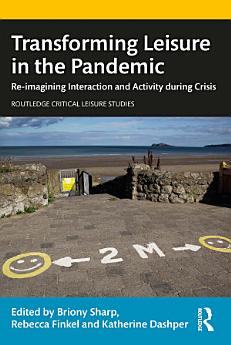Transforming Leisure in the Pandemic: Re-imagining Interaction and Activity during Crisis
About this ebook
The book seeks to understand how changes in leisure have led to transformations in the ways we have had to ‘do’ and ‘redo’ activities, such as incorporating digitalisation and distancing measures, as well as dealing with restrictions on social interaction, gatherings, and cultural activities. It presents a series of case studies covering topics as diverse as music festivals, theatre on-screen, walking, static cycling, smartphone use, holidays, and the ‘lockdown leisure’ of preschool children, including people across the life course, from young children to older retired people. The book discusses changes in patterns of behaviour, leisure experiences, and leisure environments worldwide and critically re-evaluates what leisure is and what it means in contemporary societies. It illustrates both the significant impact the pandemic has had on leisure and the important role leisure plays in helping support and maintain individual and community well-being.
This is fascinating reading for any student, researcher, or practitioner with an interest in leisure studies, tourism, events, sociology, cultural studies, or performance studies.
About the author
Briony Sharp is Lecturer in Marketing, Innovation, Tourism, and Events division at the University of the West of Scotland, UK, and Fellow of the Higher Education Academy. Her most recent research focuses on the social impacts and legacies from events, event governance, volunteering and engagement, and critical event studies.
Rebecca Finkel is Professor of Critical Event Studies at Queen Margaret University, UK, and Senior Fellow of the Higher Education Academy. Rebecca’s research situates events and festivals within social justice, gender in/equality, and cultural identity frameworks.
Katherine Dashper is Professor and Director of Research Degrees in the School of Events, Tourism, and Hospitality Management at Leeds Beckett University, UK. Her research focuses on gender and multispecies approaches to understanding leisure, sport, tourism, and events.




